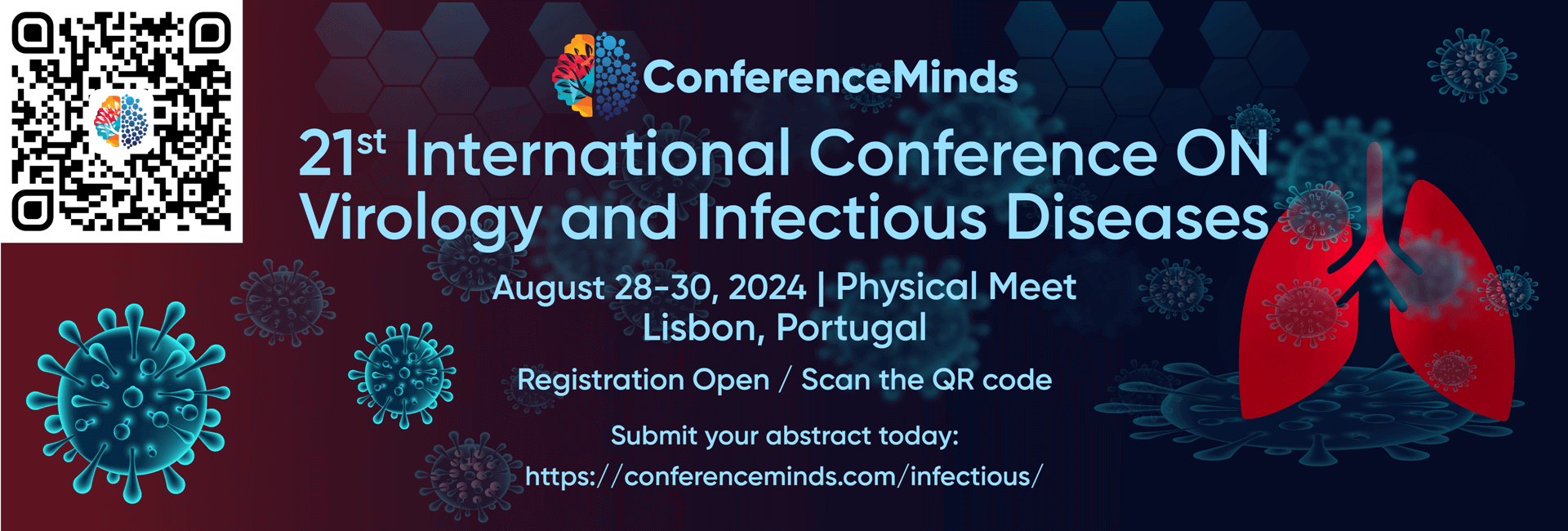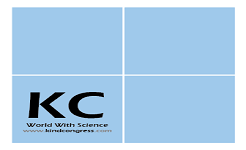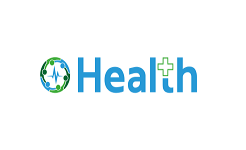
21st International Conference
ON
Virology and Infectious Diseases
Event Date
August 28-30, 2024
Venue
Lisbon, Portugal
– Previous Conference Performers / Professionals From Around The Globe –

Aikaterini Ziaka
- Physio4you, Greece

AMR Hawal
- Professor, Prime Healthcare Group UAE

Antonio Steardo
- University of Salerno, Italy

Ashraf Lotfy Fayed
- ENT Military Hospital, Egypt

Aspazija Sofijanova
- Director of Pediatric Clinic, Macedonia

Brandon P. Lucke-Wold
- University of Florida, Florida

Brankica Vasiljevic
- NMC Royal Hospital, UAE

Bruce Ogden
- Director of Operations US Foods USA

Cornelia Beyer
- University of Hull, UK

Grazzia Rey
- University of the Republic, Uruguay

Heather Carmello
- University of Rochester, USA

Howard Weber
- Penn State Hershey Childrens Hospital, USA

Irene Hamrick
- University of Cincinnati, USA

José De Jesús Curiel Valdés
- Clínical Patology, Mexico

Lloyd L. Tran
- Biomed Industries, USA

Luca Roncati
- University Hospital of Modena, Italy

Maria Braoudaki
- University of Hertfordshire , United Kingdom

Marina F Gubkina
- National Research Medical University, Russia

Peter Krcho
- Pavol Jozef safarik University, Slovakia

Pinghong Zhou
- Fudan University, China

Raffaele Pilla
- University of Salerno, Italy

Ruut Veenhoven
- Seres Therapeutics, United States

Said Moustafa M. El-deib
- Yas Clinic Khalifa City UAE

Sajidxa Marino
- Central University of Venezuela, Venezuela

Sajidxa Marino
- Central University of Venezuela, Venezuela

Sam Vaknin
- Southern Federal University, Russia

Sandra Vélez Candelario
- Catholic University of Puerto Rico, USA

Simon Treissman
- Royal Inland Hospital, Canada

Taylor Bean
- Salmon Arm, Canada

Thiago Hoesker
- Neuro surgeon , Brazil

Tracy Roake
- Danat Al Emarat Hospital, UAE

Vladimir Zajac
- Cancer Research Institute, Slovakia

William J Rowe
- Specialist in Medicine, USA

Yacob Mathai
- Marma Health Centre, India

Yu You Liu
- National Chung Hsing University, Taiwan
Media Partners/Collaborator
A huge thanks to all our amazing partners. We couldn’t have a conference without you!










Sponsors/Exhibitors
A huge thanks to all our amazing partners. We couldn’t have a conference without you!


Infectious Diseases 2024
With great pleasure ConferenceMinds welcome all the participants from across the World to attend the “21st International Conference on Virology and Infectious Diseases” going to be held on August 28-30, 2024, in Lisbon, Portugal .
This conference provides a firm platform for scientists, researchers, professors, engineers, directors of various companies, industrial professionals, and students in the field of microbiology, virology, infectious diseases, and other related fields to share their knowledge. We also take massive pleasure in welcoming various professionals from distinct countries all over the world.
Infectious Diseases 2024 is an international platform for building research works and therapeutic findings and disorders related to microbial diseases, viruses, and infections caused by bacteria, and fungi. These types of diseases may be caused due to water-borne, food-borne, and airborne in human beings as well as in plants and animals. When it comes to microbiology and virology microbes are characterized as the heart of most of the solutions to the pressing problems in the world. It also represents the increasing importance of human mortality around the globe; thereby vaccination and vaccine development plays a significant role in terms of global health.
Target Audience
- Directors, Board Members, Presidents, Vice Presidents
- Deans and Heads of the Departments
- Business Entrepreneurs and Industrialists
- Microbiologist
- Virologists
- Parasitologist
- Bacteriologist
- Pharmacists
- Epidemiologists
- Dermatologists
- Neurologist
- Ophthalmologist
- Cardiologist
- Infectious Diseases Researchers, Scientists, Faculties, Students
- Infectious Diseases Associations and Societies
- Medical Colleges, Hospitals & Labs
- Pharmaceutical Companies and Industries
- Medical devises Manufacturing Companies
- Drug Manufacturing Companies and Industries
- Laboratory Technicians and Diagnostic Companies
General sessions and Tracks
- Session 1: Antiviral Therapeutics
- Session 2: Bioinformatics and Computational Virology
- Session 3: Clinical Trials and Vaccine Safety
- Session 4: Clinical Virology
- Session 5: COVID-19 Vaccine Update
- Session 6: Diagnostic Techniques in Virology
- Session 7: Emerging and Re-emerging Viral Diseases
- Session 8: Epidemiology and Public Health
- Session 9: Future Vaccine Technologies
- Session 10: One Health and Zoonotic Viruses
- Session 11: Vaccine Development and Safety
- Session 12: Vaccines and Immunology
- Session 13: Vaccine Therapeutics
- Session 14: Veterinary Vaccines
- Session 15: Viral Evolution and Genomics
- Session 16: Viral Oncology
- Session 17: Viral Pathogenesis
- Session 18: Viral Vectors and Gene Therapy
Session and Tracks
Track 1: Infectious Diseases
Infectious diseases, caused by microorganisms like bacteria, viruses, fungi, or parasites, present a diverse range of conditions. While often harmless, they can lead to illness under certain conditions. Transmission occurs through various means, including person-to-person contact, insect bites, contaminated food or water, or exposure to environmental organisms. Symptoms, ranging from fever to fatigue, depend on the infecting organism. Mild cases can be managed at home, while severe ones may require hospitalization. Vaccines and regular hand-washing are crucial for preventing diseases like measles and chickenpox, playing essential roles in protection.
Track 2: Epidemiology of Infectious Diseases
Epidemiology focuses on studying the prevalence, incidence, and determinants of infectious diseases in populations. Despite medical progress, infectious diseases remain significant contributors to global morbidity and mortality. Epidemiologists investigate infection rates, risk factors, and implement interventions at individual and community levels. These interventions aim at preventing infections (primary prevention), hindering disease progression (secondary prevention), or managing complications and death (tertiary prevention).
Track 3: Diagnosis of Infectious Diseases
Diagnosing microbial infections involves assessing clinical and immunological features collaboratively between clinicians and laboratory technicians. Anatomic localization through physical and radiological examinations is common in clinical diagnosis. Effective communication enhances diagnostic accuracy.
Track 4: Infection Prevention, Control, and Treatment
In healthcare, effective infection prevention and control practices, including sanitation, handwashing, and ensuring food and water safety, are vital. Vaccination and antimicrobial agents play key roles in preventing and treating infections.
Track 5: Emerging and Re-Emerging Infectious Diseases
Globalization, environmental changes, and human behavior contribute to the emergence and re-emergence of infectious diseases, posing challenges to public health. Understanding and addressing these factors are crucial for effective prevention and control strategies.
Track 6: Antimicrobial Agents
Antimicrobial agents, crucial for managing infections, inhibit the growth of microorganisms. Common agents include silver, copper, and metal pyrithione, often incorporated into paints and textiles. Proper utilization is paramount to avoid the development of antimicrobial resistance, a global health concern.
Track 7: STD and Contact Diseases
Sexually transmitted diseases (STDs) result from infections transmitted through sexual contact, involving bacteria, parasites, yeast, and viruses. Prevention strategies encompass safe practices such as condom use, regular testing, and vaccination where available. The rising rates of STDs, especially among young adults, emphasize the need for comprehensive education and accessible healthcare services to promote early detection and treatment.
Track 8: Bacterial Infectious Diseases
Bacterial infections, caused by harmful bacteria, can affect various body areas, leading to conditions like pneumonia and meningitis. The classification of bacteria, including characteristics like Gram staining, influences treatment decisions. Antibiotics are commonly prescribed, but the growing concern of antibiotic resistance highlights the importance of judicious use and ongoing research for alternative treatments.
Track 9: Fungal Infectious Diseases
Fungal infections, prevalent in nature, occur when pathogenic fungi overwhelm the body’s defenses. While some fungi are beneficial, others cause infections that can be challenging to treat. Fungal infections range from superficial skin conditions to severe systemic illnesses. Management involves antifungal medications, emphasizing the need for accurate diagnosis to prescribe appropriate treatments and prevent the development of resistance.
Track 10: Neglected & Tropical Infectious Diseases
Neglected tropical diseases (NTDs) thrive in tropical conditions, affecting over a billion people globally. These diseases, caused by various pathogens, pose significant health burdens. Factors such as poverty, lack of access to healthcare, and inadequate sanitation contribute to their prevalence. Global efforts are underway to address NTDs through preventive measures, improved healthcare infrastructure, and research for innovative treatments.
Track 11: Parasitic Infectious Diseases
Parasitic infections caused by protozoa and helminths contribute to substantial morbidity and mortality, particularly in impoverished tropical areas. Control measures include public health interventions, access to clean water, and deworming programs to reduce the burden of parasitic diseases.
Track 12: Viral Infections
Viral infections, characterized by rapid onset and often short-lived symptoms, encompass a wide range of diseases, including influenza and viral hemorrhagic fever. Effective prevention strategies involve vaccination, antiviral medications, and public health measures such as isolation and hygiene practices. Ongoing research is essential to stay ahead of viral mutations and emerging infectious threats.
Track 13: Recent Outbreaks and their Control
Despite the availability of vaccines, preventable infectious diseases can still cause outbreaks. Understanding the factors contributing to these outbreaks is crucial for implementing effective control measures. Rapid response, vaccination campaigns, and public health interventions play pivotal roles in containing and preventing the spread of infectious diseases during outbreaks.
Track 14: Pediatric Infectious Diseases
Pediatric infectious diseases refer to infections in children caused by bacteria, fungi, parasites, or other rare agents. Management involves specialized care, especially for those with immune disorders. Preventive measures, including childhood vaccinations, are crucial to reduce the incidence of infectious diseases in the pediatric population.
Track 15: Food and Water Borne Infections
Contaminated food or water can lead to various infectious diseases, with symptoms ranging from flu-like to gastrointestinal issues. Proper food handling, processing, and water treatment are essential for preventing food and waterborne infections. Public education on safe food practices is crucial to reduce the risk of outbreaks.
Track 16: Pulmonary and Chest Infections
Infections affecting the lungs or airways are known as chest infections. Viruses and bacteria can cause respiratory conditions such as pneumonia and bronchitis. Early diagnosis, appropriate treatment, and preventive measures, including vaccination against respiratory infections, are essential to manage pulmonary and chest infections.
Track 17: Dental and Oral Infectious Diseases
Oral infectious diseases occur in the mouth and the entrance of the digestive tract. Common infections include dental caries, periodontal diseases, and oral tissue membrane diseases. Periodontal infections are prevalent in adults and require proper oral hygiene practices, regular dental check-ups, and early intervention to prevent complications and maintain oral health.
These tracks cover a comprehensive range of topics within the field of infectious diseases, providing insights into prevention, diagnosis, and treatment strategies. Each track contributes to the collective understanding of infectious diseases, fostering collaboration and advancements in research and healthcare practices.
Market Analysis
The Infectious Diseases Conference in 2024 is anticipated to be a pivotal event, reflecting the ongoing challenges and advancements in the field of infectious diseases. Market analysis suggests a sustained demand for forums that address infectious diseases, given the persistent global threats posed by emerging infections, antimicrobial resistance, and the need for rapid responses to outbreaks.
The market for infectious diseases conferences is expanding due to various factors. The ongoing impact of the COVID-19 pandemic, coupled with the threat of other infectious diseases, highlights the importance of knowledge-sharing and collaboration among healthcare professionals, researchers, and policymakers. This conference is expected to attract a diverse audience, including infectious disease specialists, microbiologists, epidemiologists, and representatives from public health agencies.
Key drivers for the growth of this market include the continuous evolution of infectious diseases, the need for effective surveillance and diagnostic tools, and the development of novel therapeutics and vaccines. The Infectious Diseases Conference serves as a crucial platform for disseminating the latest research findings, discussing public health strategies, and fostering global collaboration to address infectious disease challenges.
Pharmaceutical companies, biotech firms, and diagnostic technology providers often leverage the conference to showcase their contributions to infectious disease management. As infectious diseases remain a significant global health concern, the market for conferences in this field is expected to witness sustained growth. The conference will likely play a vital role in advancing our understanding of infectious diseases and facilitating the collaboration necessary to mitigate their impact on public health.
– Tracks & Key Topics –
- Covid 19
- Microbiology
- Clinical Microbiology
- Microbes and Infectious Disease
- Virology
- Clinical Pathology
- Bacterial and Viral Vaccines
- Medical Microbiology
- Food Microbiology
- Industrial Microbiology
- Microbial Genetics
- Microbial Laboratory
- Mycology
- Bacteriology
- Diagnosis and treatment of infectious disease
- Airborne Transmission
- Antibiotics
- Antibody
- Antifungal
- Antigen
- Antimicrobial Resistance
- Antiparasitic
- Antiretroviral Therapy
- Antiseptics
- Antiviral
- Bacterial
- Bacterial Genetics
- Bioterrorism
- Case Fatality Rate
- Chlamydia
- Cholera
- Contact Tracing
- Contagious
- COVID-19
- Cross-contamination
- Cross-immunity
- Dengue
- Disease Surveillance
- Disease Vectors
- Drug-Resistant Pathogens
- E. Coli
- Ebola
- Emerging Infectious Diseases
- Endemic
- Epidemic
- Epidemiology
- Fomite
- Foodborne Illnesses
- Fungal
- Fungal Pathogenesis
- Global Health Threats
- Gonorrhea
- H1N1
- Hand Hygiene
- Hepatitis
- Herd Immunity
- HIV/AIDS
- Hospital-acquired Infections
- Host Susceptibility
- HPV
- Hygiene
- Immune Modulation
- Immune Response
- Immune System
- Immunization
- Immunosuppression
- Incidence
- Incubation Period
- Infection
- Infection Control
- Influenza
- Isolation
- Lyme Disease
- Malaria
- Measles
- Microorganism
- MRSA
- Norovirus
- Nosocomial Infection
- Opportunistic Infection
- Outbreak
- Pandemic
- Pandemic Preparedness
- Pandemic Response
- Parasitic
- Parasitology
- Pathogen
- Pathogen Identification
- Pneumonia
- Polio
- Prevalence
- Public Health
- Quarantine
- Rabies
- Reservoir Host
- Resurgence
- Salmonella
- SARS
- Staph Infection
- Superinfection
- Syphilis
- Transmission
- Transmission Chain
- Tuberculosis
- Typhoid
- Vaccination
- Vector Competence
- Vector Control
- Vector-borne
- Viral
- Viral Genomics
- Waterborne Diseases
- West Nile Virus
- Zika
